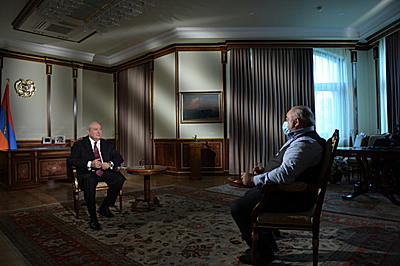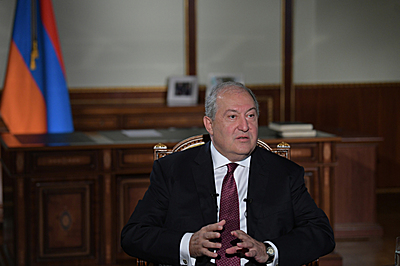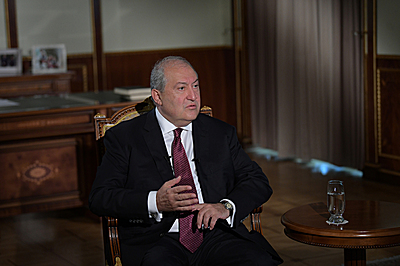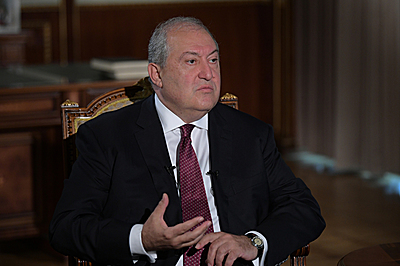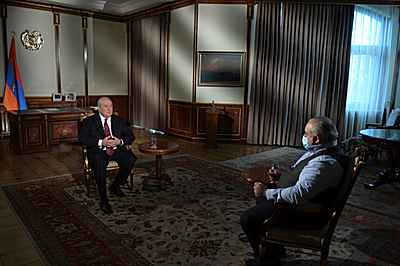Interviews and press conferences
We all have to learn from our nation – unity, dedication, national values and confidence that we will win
President Armen Sarkissian gave an interview to the Public TV station.
Petros Ghazarian: Good evening, Mr. Sarkissian, thank you for finding time for a conversation.
President Sarkissian: Good evening.
Petros Ghazarian: What’s your general assessment of the situation since it changes every minute.
President Sarkissian: I would like to start to assess the situation with my impressions of what’s going on in Armenia and Artsakh. And to be honest, my initial feelings are very human. I admire our people’s unity since day one, September 27. That spirit of unity which lives in everyone, from old to young, and confidence that we will withstand this menace, this war, in some sense reminded me of 1988-89 when our people were gathering at the Opera Square and taking the road for independence; there was that feeling of unity, newly awaken feeling of freedom of the people which took the road to restate its statehood. I am amazed, really. On the first days of my becoming president, when I was drafting my first appeal, it was April 2018, there were two key words – “tolerance”, because a movement started, and the second word was “unity”. It is noteworthy that during these two years, these two words have been in all my messages.
Today, after September 27, I realized that it is unnecessary to mention unity in my appeals because the people have gave us all a lesson of unity. Self-organized, they demonstrated excellent discipline, discipline which surprised many of my foreign friends, who are aware of what’s going on in Armenia, they are surprised and voice their admiration. Thus, I think if I am to write the word “unity” in my future addresses, it will be directed to politicians or analysts only.
Petros Ghazarian: Are you content with their unity?
President Sarkissian: I am talking of the people’s unity and everyone readiness to unite. The feeling I wanted to share with you are admiration and pride. The fact that young people are ready to join as volunteers and continue with the mission started 30 years ago can bring only pride. I believe our own people are giving us a lesson because very often we speak of national values, our national aspirations and each Armenian family from the most remote village to the cities proved that our national values live inside our families. I also think that possible the road is that of our great Komitas. To find our classical Armenian music, Komitas Vardapet was travelling to villages, was walking around and putting on the paper songs of the villagers. Later, those were edited and became what today is called Armenian classical music. It means that the find our national values, we probably need to go to villages again, to Armenian families and learn what our national values are.
There is also pain because in the last five days we have been learning constantly of human losses. Of course, it is tough and I would like to hold every father’s and mother’s hand, who lost their son, or wife, who lost her husband, or children, who lost their fathers, and try to console them. Though consolation is hard at this moment.
Each soldier or individual, who lost his or her life for the Fatherland, started that day as a citizen of the Republic of Artsakh or volunteer from Armenia, but ended that day as a hero of our nation.
I would like to repeat with pride and admiration that today the spirit of 1990s is present today.
I remember very well how at the beginning of 1990s, when Armenia became independent, I was ambassador and in a number of countries, also NATO, EU, European countries and in general was dealing with Europe-related issues.
At that time, our so-called “friends” were doing arithmetic only, saying, you know, Armenians are small in numbers, Azerbaijan is much larger, has more arms, Turkey is assisting them directly and indirectly, etc. Thus, the arithmetic were telling that the people of Artsakh and Armenian nation at large have no chance to win in that war. It turned out that our life is not arithmetic. It’s a very complex and elevated calculation because human reason and dedication cannot be calculated. Certainly, there were huge difficulties in those times, statehood was being establish, army, a central bank, financial and immense economic difficulties but the Armenian people won. And the same people, who were telling me at the beginning of 1990s that Artsakh had no chance, today are telling that Artsakh has the most powerful Army in the region.
History repeats itself because there are people who will make their math again that we don’t possess this or that equipment, this one is scarce, this other one is inadequate, it’s tough, borders are closed, logistics will be difficult, etc., etc. But in this math the people don’t take into consideration the highest “algebra” which is the human nature. People cannot imagine that each Armenia also has some supranatural power which comes from our past, our essence, or genetics or because every Armenian possesses a number of major values. Those values are painful: one of them is the history of Eghern and neither one of us, from young to old, want that history to be repeated. This is genetic because is related to our national existence. By national existence I mean not only the existence of the Republic of Artsakh but also of the Republic of Armenia and entire Diaspora.
More figuratively, in a color spectrum, it is absolutely clear for me that any Armenian has three colors in his or her head which the colors of our flag – our statehood, Artsakh statehood and our national values.
Today difficulties are different because our people, first of all, the people of Artsakh are conducting simultaneously a number of wars. The first is Artsakh war, which Azerbaijan restarted on September 27, second – Turkey participates to this war, and this is a new war, and the third is certainly coronavirus, the pandemic which, in fact, even without the war, created huge problems for our healthcare system and loss of lives.
Petros Ghazarian: Probably they have calculated that too?
President Sarkissian: No doubt, there are emanating and subsequent economic difficulties… And the pandemic and military actions will result in difficult, very tense situation for the economy, and we will have problems. All this has another appeal or feeling – vigilance. I am proud that we are so passionate. I am proud that we stand united, stand ready to serve the Fatherland but all this must be done with very cool mind and somberly, organized, disciplined and assessing shrewdly all, positive as well as negative sides. In military actions, in business, and politics there are different ways to achieve success. One of them is to program success. Another is to calculate possible defeat and isolate it. There were great military commanders, Napoleon is the most famous of them, who was creating his strategy ruling out defeat all together rather than planning victory. In our case we have to plan victory and rule out defeat. It means that in this war we have to consider that a short-term as well as a long-term war are possibilities. War not only on the battle field but also in the virtual world, in the diplomatic area. Victory depends on our unity and the nation’s vigor, spirit, and common will.
Petros Ghazarian: Mr. President, in war, everywhere motivation which makes the parties fight is very important. Which are they?
President Sarkissian: Our goals and Azerbaijan’s goals differ. We are fighting for our life. Our compatriots in Artsakh and the entire Armenian nation are fighting for life. The Azerbaijani side is fight for territories, for land and calls it territorial integrity.
That territorial integrity was presented to them as a gift for 70 years by Stalin. There was no Karabakh part of Azerbaijan before that, for millennia it was an Armenian principality, Armenian land, Armenians living there saw not only Azeris but also Genghiz khan and other invaders. We are fighting for Armenian life and our right to live, for the right to live on the land where we were born, were our ancestors live, where we created culture.
Petros Ghazarian: What is Turkey fighting for?
President Sarkissian: I will come to that but I want to make a clear distinction: respect toward others is significant in our life philosophy, and it is very much observable. If you travel to Shushi today, to Karabakh there are no Muslim mosques. There are no mosques not because Armenians erased them but because Azerbaijanis never lived there. In Shushi Azerbaijanis lived with Armenians, and there is one mosque. And unlike Turks and Azeris, we, Armenians also through the assistance of our friends abroad renovated that mosque. I was in Shushi last year and took pictures in front of the mosque and sent them to my friends in the Arab, Islamic world. We are different. As I said, the goal of the Azerbaijani side is to take that land and erase Armenians. There is an international term for it – ethnic cleansing. It doesn’t even need translation. It is a medieval method. Small nations, states always inspired for independence to have their own culture and values in their own hands. In Middle Ages such aspirations were also crushed by wars. But in the contemporary world, after WWII, in the 20th century when values of many people become higher, another situation was formed when people’s right for self-determination becomes very significant.
Petros Ghazarian: We have what we have, Mr. President.
President Sarkissian: I want to draw comparison for the following reason: our Armenian approach is one of a modern man, the response we get is a medieval response.
Petros Ghazarian: Why the Turks got involved, why they decided to attack us, to bring terrorists from Syria?
President Sarkissian: First about Azerbaijani side in two words. It is regrettable that the Azerbaijani side after certain processes decided on September 27 to through away the process of negotiations. During any negotiations, regardless of whether it is political, military, business, the process doesn’t necessary makes you happy always but it doesn’t mean one should walk out. The very meaning of negotiations is to have a process during which parties can talk or establish confidence through the dialogue and ultimately reach a conclusion acceptable for the parties.
Unfortunately, Azerbaijan decided to walk out. If we recap the results of the first five days, the first point will be the following: five days proved that Azerbaijan cannot defeat Artsakh in war.
Petros Ghazarian: Proved?
President Sarkissian: It is being proved at this very moment.
Petros Ghazarian: They are still where they started.
President Sarkissian: It’s been proved they cannot win. Goals they set – to conquer Artsakh in a short period of time, Stepanakert, it all came to naught, and today we are talking of the results of this five days of war. It’s been proved in a very interesting way that after this war, Turkey has a great influence on Nakhijevan, military and political. I believe, today, Turkey’s influence is much bigger that Baku’s. The second fact is that today Turkey is a party to this conflict, obviously. If I put Azerbaijan’s motives on a side and speak of Turkey: I give interviews to 4-5 major media outlets daily and each of them asks the same question – Turks are telling this, what’s your opinion? And what the Turks are saying is a commonplace: first reason for their involvement in Karabakh – they have come to help their ethnic brothers. And you know what, Turks’ ethnic brotherhood doesn’t end with Azerbaijan – they are present in Iran, North Caucasus, different regions of Russia, Central Asia, to Mongolia and China. To continue with ethnic brothers they live also in Germany, Sweden and other places. What does it mean? Anywhere their ethnic brothers are having a problem and Turkey intervenes with medieval methods? This justification, reasoning is totally unacceptable. Second reason is that there are allegedly PKK fighters in Armenia which is nonsense. On the contrary, there are Kurdish and Yezidi national minorities in Armenia and these people, who live in Armenia, are citizens of Armenia, who live in Artsakh, and citizens of Artsakh, there are other minorities, too. And they as citizens, like Armenians, many of them as volunteers go to defend their country. Third, they are trying to impress, especially the West, with energy issue, as if they are protecting the gas pipeline. There is no logic in it. Baku-Tbilisi-Ceyhan pipeline and construction of a new one happened 20 years ago. Should the Armenian side – Artsakh or Republic of Armenia had any intention to bomb that gas or oil pipelines, it would have been done 20 years ago, when the first 100 meters were laid because it would stop the construction. It could have been done in the following 20 years and Azerbaijan wouldn’t have billions of dollars which it used to purchase arms and use that oil to get weapons against Armenia, killing not only Armenian troops but also Armenian women and children.
Petros Ghazaryan: Mr. President, what is the real reason…
Armen Sarkissian: To say that today Armenia is planning to attack that pipeline is complete nonsense. Now let’s talk about reality. Let’s consider what’s occurred during these last years. In the last two decades, Turkey, which is a partially militarized state, transitioned into a more civilian form of government. But this civilian form of government is of a particular nature and quality. Secondly, Turkey saw huge economic growth and became a desirable place for investors. However, during the last few years, the majority of those investments, of those large companies, have left Turkey – not only because of its decline, but also because the conditions for business are unacceptable.
Instead, it’s as if we’re returning to the Ottoman Empire. It’s as if we are going back in time a hundred years. Why? Because today Turkey has seemingly decided that it has interests in Northern Africa, Egypt, Libya, Iraq, the entire Persian Gulf, and Syria. Today Turkey also speaks of possible tensions with Bulgaria, and finally now in the Caucasus too. In 360 degrees, Turkey is acting as if it were the old Ottoman Empire. I have a good friend, an analyst, who likes to make the comparison that if during the first world war (or before then) Turkey was called Europe’s “sick relative,” then, by his estimation, today that sickness would be called a cancer that spreads everywhere, and wherever it spreads it creates a mutation.
Of course, in terms of time, preparations were ongoing, and the timing was chosen very precisely. The United States is busy with its presidential elections, Russia is busy with Belarus, Ukraine, and so on.
Petros Ghazaryan: Covid?
Armen Sarkissian: No, everyone’s busy with that. What are the real motives? We can make assumptions, but let’s consider the result. Yes, of course, one goal is to teach Armenia a lesson. To teach Artsakh a lesson and show Azerbaijan that if they can’t solve the Karabakh problem then Turkey will.
Second, to teach Armenia a lesson and remind Armenia that if you think we’re going to accept the Armenian Genocide, you are cruelly mistaken – and beware of a second genocide. And, of course, if we look at the state of Azerbaijan’s economy, today Turkey has a huge presence in the country. And that presence is not only through officers, through soldiers, generals, political or military advisors, it’s also through the military strength and technology that Turkey controls. Using Karabakh as an excuse, huge amounts of military technology has been placed along the pipelines. At the same time, they brought with them mercenaries who are jihadists, which means they are terrorists, and there aren’t just one or two of them or one hundred, there are several thousand. The war, let’s assume, will end in a matter of days. What do you think? Will Turkey leave Azerbaijan or no?
Petros Ghazaryan: Of course not.
Armen Sarkissian: What do you think, will the jihadists leave and go home? They will look for a new place. That place is definitely not Artsakh or Armenia. They either have to go south or toward the east – to central Asia or toward Russia and so on. But if this plan is realized, one thing is for certain. Turkey’s presence in Azerbaijan will mean that they will have a huge influence in the making of political decisions.
Petros Ghazaryan: Meaning, in all cases they will come out as winners?
Armen Sarkissian: In all cases, they come out as winners, and not only in Azerbaijan. Another of my good friends says that as a result of this, Russian and Turkey will have a land border.
Petros Ghazaryan: They won’t win in Artsakh, they’ll win in Azerbaijan.
Armen Sarkissian: Yes, they won’t win in Artsakh, they will win in Azerbaijan. And of course, they will have a victory in regards to the international community, because they will substantially increase their dangerous presence. Imagine – it’s one thing when international oil companies negotiate with Azerbaijan’s government, signing agreements. However, today those oil routes will be controlled by Turkey. And to an extent, Europe, which receives that oil and gas, will become a hostage to Turkey.
Petros Ghazaryan: So Azerbaijan is losing its sovereignty?
Armen Sarkissian: I can’t make that statement. Analysts can suggest an answer to that question. As the President of Armenia, I cannot make such a claim, but I’m sharing with you an opinion that many analysts have today.
Turkey has always had issues in the energy sphere and for that reason it’s been very important to them that Azerbaijan’s oil, which is not only Azerbaijan’s oil, it is oil and gas coming from the Caspian Sea and Central Asia…
Thus, they gain control of all of that. If in the past they were just recipients or clients, then in this case, in some way, they become a controlling party. Don’t doubt that they will use this means of control against Europe, the international community, and others in a very effective way. People ask me if this is in fact an energy war, having in mind that Turkey came to defend the pipeline from Artsakh. My answer is the following – both no and yes. No, because Artsakh does not and has never had any intention of destroying energy infrastructures. And yes, because Turkey will have a say in controlling those structures.
Petros Ghazaryan: Mr. President, what kind of situation do we have now? Today Turkey hit Stepanakert, it’s clear that Aliyev has entered a game; going with Turkey will create very serious political problems for him. We have the whole world’s response. One might say that the full diplomatic potential to end the war has already been reached. We have seen the individual statements of the Minsk Group’s co-chairs; Macron blamed Baku…
The full toolkit of diplomacy has been used, but we have Turkey who says, “I don’t care about the world’s opinion, we’re going to have war.”
Armen Sarkissian: I don’t think that the full potential of diplomacy, politics, or strategy has been reached. Until September 27, we had a situation where the Artsakh conflict was between Armenia and Azerbaijan, and there was a balance that today has been substantially destroyed because there is a new player, which is Turkey. If we want to return to the old format, then there’s naturally only one way, and that is for Turkey to leave.
Petros Ghazaryan: They’re not leaving.
Armen Sarkissian: Driven by inertia, a large part of the international community still thinks that this conflict is once again about Artsakh’s fundamental issue: territorial integrity against the right of self-determination, and so on. Consequently, their calls are bilateral, directed at both Armenia and Azerbaijan — and Artsakh — they say stop your military actions. I think that in a very short amount of time we have to employ all possible diplomatic and political means to explain to our allies and non-allies — to the international community in general — that we are dealing with a completely different situation, which is dangerous not only for Artsakh and Armenia, but for the entire region. We’ve already spoken about the dangers Turkey will bring with it to the region. It’s time for the international community to stop Turkey by exerting pressure through different means that have not yet been exhausted. I believe that we must do everything, through our official diplomacy, our government, our parliament…
Petros Ghazaryan: It’s been declared that a third party shouldn’t take part in the conflict; Russia, Iran, and the United States have openly stated this – what else can they say?
Armen Sarkissian: I’m sorry but my diplomatic experience has taught me that there’s saying something and then there’s saying something. There are different ways of stating the same thing. You can express that one day you’ll put actions behind your words.
Armenia has not yet played all its cards as a member of bilateral agreements or as a member of different international structures. We have to use various diplomatic pressures within international structures and organizations, from the European Union to NATO. We must speak both with our friends and adversaries.
Here there are different kinds of diplomacy. There is official diplomacy, there is also civil diplomacy. In our case, civil diplomacy is our diaspora.
Taking advantage of this moment, I’d like to address all the members of our diaspora. I wand to first and foremost say thank you because, being connected to the individuals, communities, and countries of the diaspora, from different places, I constantly hear of great anxiety and a willingness to provide support.
I want to let you know that your continued financial support realized through the All-Armenia Fund is of the utmost importance. If you can send supplies, please do it in a targeted way. For example, sending sleeping bags for soldiers is quite acceptable, or sending needed supplies to the army or ministry of health — anything that is absolutely necessary for this fight.
At the same time, every single one of you must become an ambassador for Armenia in your own country. You must present the real situation to the government representatives and political figures who are connected to your community.
I repeat, due to inertia, in the imaginations of many this is the old Artsakh-Azerbaijan conflict, where both sides need to be told not to shoot and so on. After September 27, we entered into a totally new phase of our history. We need to explain this phase to our friends and to those who for some reason or another are friendlier with Azerbaijan and Turkey – although, the number of these individuals today is not very large. I think that it’s our responsibility to offer these explanations through official, non-official, and civil diplomacy, as well as through our diaspora. Of course, this war will end with a victory for us, because five days in we proved and five days from now will prove again — as we did at the beginning of the nineties — that this nation cannot be defeated.
It will be painful because we will have casualties. We already do. It is painful, but there is no other road besides defending our homeland.
Petros Ghazaryan: Mr. President, you say that our diplomatic resources are not exhausted?
Armen Sarkissian: I think that we still have much to do. If diplomacy — our resource for shaping international opinion — was exhausted, then why would I give four or five interviews per day to China, to national Indian TV, to Al Jazeera? Why are we engaged in this if we believe that it’s been exhausted? No, we haven’t depleted it. Just as our soldiers on the battlefield are standing strong and fighting every day, so in the political field, in official international diplomacy, we have immense things to accomplish and we must gather all our strength it reach our main goal: the protection of Artsakh’s people and victory. And the rest, whether that’s what’s happening in Azerbaijan, or who will control the pipeline — Azerbaijan or Turkey — that is a topic that we must discuss with our European, western, and eastern partners. We must tell them to think about their future, because these changes, this wave, will not only hit us, it will hit you too.
Petros Ghazaryan: How would you evaluate the actions of our government and our state during these five days – in the diplomatic sphere, in the military sphere?
Armen Sarkissian: You know, I’m not a member of the security council, but am invited to their sessions and I offer my opinions and advice. And I think that at this moment my responsibility lies not in giving my opinion to the public but to the government, to the security council; I’m ready to share my connections, my life experience, and my understanding with them. That doesn’t mean that my opinion is the ultimate truth, but in any case, when you’re having a debate, opinions based on experience can be very helpful. And I never for a second doubt my opinion and share it with conviction.
I think that my responsibility here is not to give an evaluation at this particular moment, because we are all in this together, from the president and government to the parliament, ruling party, and opposition — we are all in this together.
I want to remind you that we must all learn from our people, learn that in all our hearts and minds lives the tricolor. We must all learn from our people about being united, about devotion, national values, and having faith that we will win.
Petros Ghazaryan: Thank you, Mr. President.
